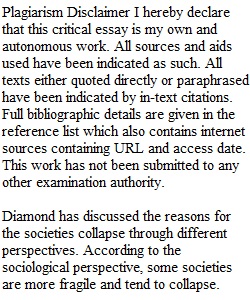


Q Unit 4 Assignment: Disciplinary paraphrasing of Diamond Overview: Your task is to compose at least six independent paragraphs discussing ideas and information presented by Diamond (2003). The minimum length of the assignment, when all six paragraphs are combined, is 600 words. You may not use direct quotes when discussing Diamond’s work. Objective 1: Making disciplinary distinctions. Each paragraph must mention at least one scholarly discipline in a way that demonstrates your basic understanding of the kind of knowledge generated by the particular discipline as distinguished from other disciplinary approaches. For example, if your paragraph mentions the sociological aspect of something, the content of the paragraph should discuss something distinctly sociological; replacing the word “sociological” with “historical” should render the paragraph inaccurate or nonsensical. At several points, Diamond mentions disciplines specifically. In other cases, the relevant discipline is identifiable in context. Diamond’s work is highly interdisciplinary, so you should have no trouble identifying six and composing paragraphs about those particular aspects of the presentation. Objective 2: Accurate paraphrasing based on notes. Because you will not be using quotes, each time you mention Diamond’s (2003) material, you will either be summarizing or paraphrasing. Is it important that you work from notes and avoid copying partial or complete sentences spoken by Diamond? You will be expected to convey accurately ideas and information presented by Diamond in a precise and concise language without reproducing word-for-word sentences or phrasing. When you paraphrase, everything you write must be in your own words; not even a part of a sentence can be the same as the original. Just changing a few words here and there does not help. You can use a few of the original nouns, but that's about it. The wording you use must be original. And you must cite paraphrased material because the ideas in the reference sources are the intellectual property of the original authors. Quote citations count only for the quotations. You still must cite paraphrased material separately. Objective 3: Use of APA-formatted in-text citation. You will need to cite Diamond using APA formatting for in-text citation. (As demonstrated in the paragraphs above, once you have cited the year of publication in a paragraph, you need not continue citing the year every time you mention the author in the same paragraph.) Try to avoid using the same wording, sentence structure, and citation pattern in each paragraph. When you are composing a paper, repeating the same phrasing in each paragraph (According to Diamond (2003)… According to Diamond… According to Diamond…) will become distracting. Consult the FAS module “Summarization, paraphrasing, Notes, and Quotes” for more information, including a list of basic in-text citation sentence integration options. You may adopt or adapt any of the examples below in your paragraphs. • From a sociological perspective, Diamond (2003) highlighted…. • Diamond (2003) discussed the psychological impact of…. • The economic issues noted were related to… (Diamond, 2003). • The scientific evidence presented included research from the field of _____ (Diamond, 2003). • Diamond (2003) raised an important point regarding the historical…. • Diamond’s (2003) framework highlighted the ecological…. • Diamond (2003) presented the issue of _____ from an anthropological perspective, noting the cultural dimension of… • During his presentation, Diamond (2003) raised a philosophical question related to the nature of…. • Diamond (2003) made an interesting point related to the field of cognitive science when he noted that…. • Diamond (2003) noted the relationship between the psychological impact of _____ and the economic…. • Highlighting the relationship between (discipline) and (another discipline), Diamond (2003) used the example of…. Important Note: Summarizing and paraphrasing are essential writing skills that need to be developed by university graduate students. Appropriate writing skills of summaries and paraphrases include appropriate citations of the summaries and paraphrases of research and ideas of theorists, professionals, and authors for graduate-level writing. Use the examples and the guide provided to you in your course materials as you write. Do not assume you already know how to do this. Take this opportunity to improve your writing skills. Examine the course materials and apply what you learn to the paragraphs you write for this assignment. This assignment is vital to the writing skills that are expected in your research paper in this course. You may notice that this exercise is very similar to an exercise in LSTD 5003. The purpose of this similar assignment is intended to reinforce what you learned in LSTD 5003 because practicing the writing techniques for paraphrasing and summaries are vital to your success in academic writing. We are confident that your careful attention to this assignment and to the application of these writing skills to your research papers will elevate your graduate-level writing and will be of value to you in all of your graduate courses.
View Related Questions